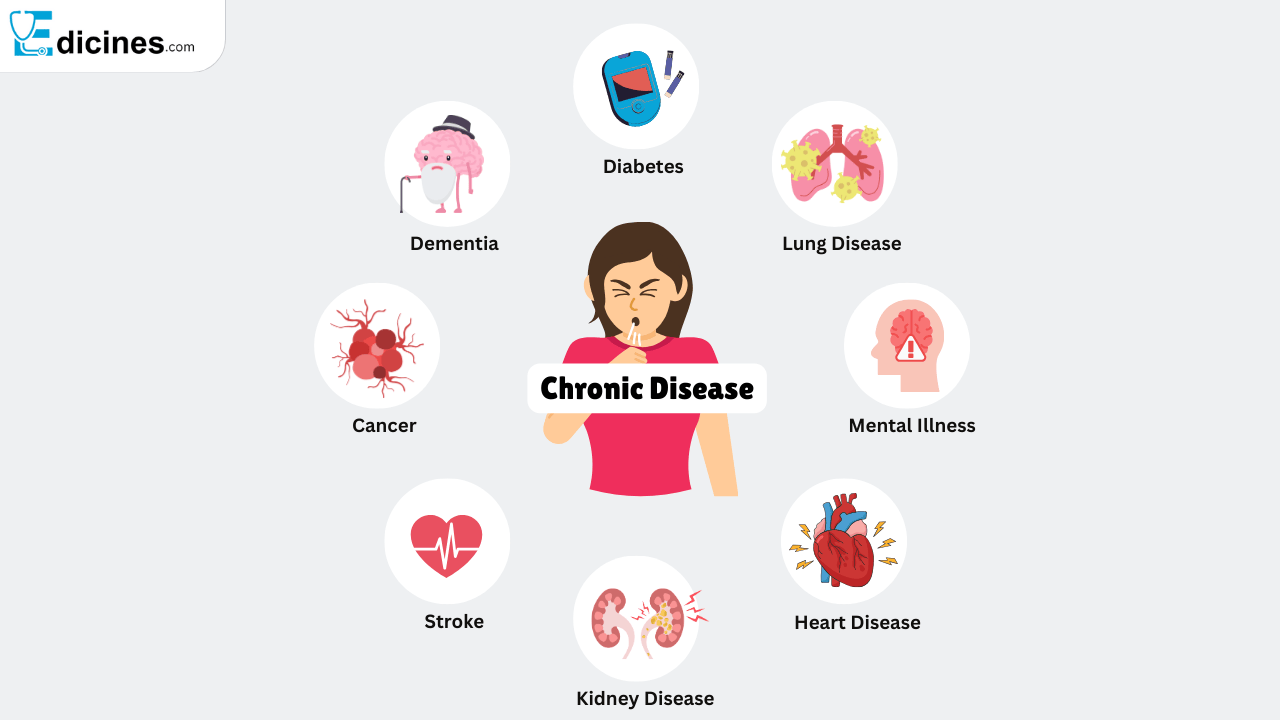The long-term health and well-being of an individual depend on chronic disease prevention. This approach has been shown to improve the quality of life while extending lifespan by lowering the risk of life-threatening conditions. Integrating preventive strategies for chronic illness into daily routines can have a significant effect on overall health.
What are Chronic Diseases?
Chronic diseases are illnesses that are usually slow and progressive in nature causing constant health challenges. Some examples of chronic diseases include: diabetes mellitus, cancer, heart disease, stroke, and arthritis.

These ailments remain among the leading causes of mortality and disability globally. To avert these conditions, this entails making lifestyle adjustments, engaging in healthy behaviors as well as frequent medical check-ups.
Role of Diet in Preventing Chronic Diseases
Nutrient-Dense Edibles
An all-inclusive menu is fundamental in hindering long-lasting illnesses. By eating nutrient-packed products like fruits, vegetables, unrefined cereals and low-fat proteins one keeps fit as well as free from diseases. These foods are rich in vitamins, minerals, and antioxidants, which are essential for long-term health.
Minimizing Processed Foods
Processed foods, particularly those high in sugar, unhealthy fats, and sodium, play major roles in causing chronic health problems such as obesity, diabetes mellitus and heart failures. Cutting down on manufactured items and replacing them with natural whole food is a must-do lifestyle adjustment for prevention of diseases.
Maintain Hydration
To stay healthy and live longer, we need to drink enough fluids. The right amount of water to drink helps support body functions, thereby minimizing chances of such chronic ailments like kidney diseases or urinary tract infections.
How Exercise Contributes to Chronic Disease Prevention
How Exercise Helps Us
Regular physical activity is among the best measures to prevent chronic diseases. By exercising, one can maintain a healthy weight, enhance cardiovascular function, and lower the risk of diabetes, some cancers as well as heart ailments. It also has positive effects on mood and psychology thereby making living more enjoyable.
Recommended Exercises
Including at least 150 minutes (2.5 hours) of moderate-intensity workouts like walking, cycling, or swimming in your weekly routine reduces the risk of developing chronic diseases. Resistance training done on two occasions every week increases muscle strength and bone mass as well thereby rendering your health even better.
Also Read: Beginner’s Guide to Strength Training at Home
Impact of Weight Management on Disease Prevention
Consequences of Being Overweight
Excess weight, especially obesity, puts an individual at risk for chronic diseases like diabetes, coronary artery disease and breast cancer. In order to stay free from these chronic illnesses and enhance general well-being, maintenance of a certain body weight is key.
Tips on Managing Weight Effectively
Some effective methods for controlling people’s weights include following balanced diets consistently throughout life or doing physical exercises regularly alongside practicing portion control and being mindful about what we eat today. The concept on how this lifestyle can help in keeping proper body weight remains intact.
Managing Stress to Prevent Chronic Diseases
Stress Health Impacts
Chronic stress is the cause of several health issues such as high blood pressure, heart disease, and disorders related to mental health. The management of stress is important because it can prevent chronic diseases and hence increase wellbeing overall.
Stress Reduction Techniques
There are different stress management techniques used like mindfulness techniques, deep breathing exercises, yoga, or regular relaxation activities which help reduce the negative effects of stress on our bodies. Furthermore, engaging in hobbies, spending time in nature and keeping close ties with friends and relatives also aids in reducing tension.
Importance of Preventive Health Screenings
Routine Health Screenings
Regular health check-ups and screenings are vital for early detection and prevention of chronic diseases. Preventive screenings help identify potential health issues before they develop into more serious conditions.
Recommended Tests
These include common preventive tests blood pressure checks; cholesterol levels, blood sugar testing, and cancer screenings. These tests allow for early intervention, which is crucial for chronic disease prevention.
Eliminating Habits That Increase Disease Risk
Smoking
Chronic disorders like lung cancer, heart ailments and respiratory diseases are some of the major contributors to this vice. This can significantly cut down the probability of each disease happening to anyone.
Excessive Alcohol Consumption
Excessive alcohol consumption can lead to chronic conditions such as liver disease, certain cancers, and cardiovascular dysfunction, among others. Reducing alcohol intake is an effective way to prevent these long-term health issues and increase life expectancy.
Creating an Environment that Supports Health
Social Support
The social support system that is strong motivates for good habits, and also help in reducing risks of chronic diseases. To make effective lifestyle modifications, you need to share your life with individuals who emphasize on maintaining good health and fitness.
Good Lifestyle Changes
Having a health-oriented home and workplace will lead to healthier choices. Small modifications like planning for meals, exercising regularly and relieving stress in your surroundings may go a long way in deterring chronic illnesses
Conclusion
It is essential to take a comprehensive approach in preventing chronic diseases which encompasses healthy eating, engaging in regular physical activity, controlling weight, minimizing stress levels, abstaining from harmful lifestyles and going for routine health check-ups.
Consequently, these are the strategies that can help individuals avert any risk of chronic diseases and have fulfilling lives. You should implement these recommendations now in order to have better health outcomes in future as well as long-lasting wellness.













